Key takeaways:
- Selective mutism is a complex anxiety disorder affecting children’s ability to speak in social situations, often due to anxiety and self-esteem issues.
- Building a strong support network is essential, as it provides emotional reassurance and practical strategies for those dealing with selective mutism.
- Identifying individual support needs is crucial; recognizing whether one needs someone to listen or to help practice speaking can guide effective support sourcing.
- Engaging with local and online support groups fosters a sense of belonging and community, making struggles feel more manageable through shared experiences.
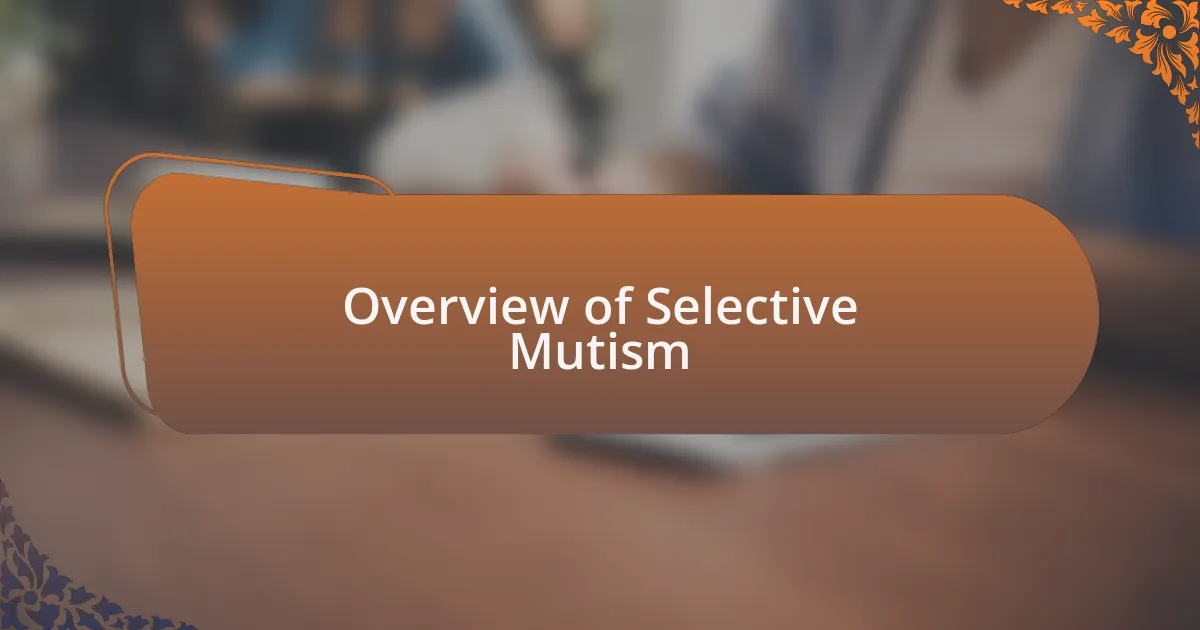
Overview of Selective Mutism
Selective mutism is a complex anxiety disorder primarily affecting children, manifested by an inability to speak in certain social situations, despite speaking in comfortable settings. I remember a time in my life when I would lock up my emotions around classmates, rendered mute by anxiety, even though I was brimming with thoughts and ideas. Isn’t it heartbreaking to think that so many struggle silently, fearing the judgment of others?
Imagine being in a room full of peers, wanting to join the conversation, yet feeling an invisible barrier preventing you from speaking. This was my reality during my formative years. I often wondered, why does it feel easier to express myself with close friends or family, while the thought of speaking up in a classroom filled me with dread? This emotional turmoil is common among those with selective mutism, who may find it challenging to navigate their social worlds.
The fear that defines selective mutism isn’t just about reluctance to speak; it often intertwines with deeper issues of anxiety and self-esteem. I found that even small interactions could seem monumental, leaving me wondering how a few simple words could feel so monumental. This experience highlights the urgent need for understanding and support from peers and adults to foster a safe, encouraging environment for those with selective mutism.
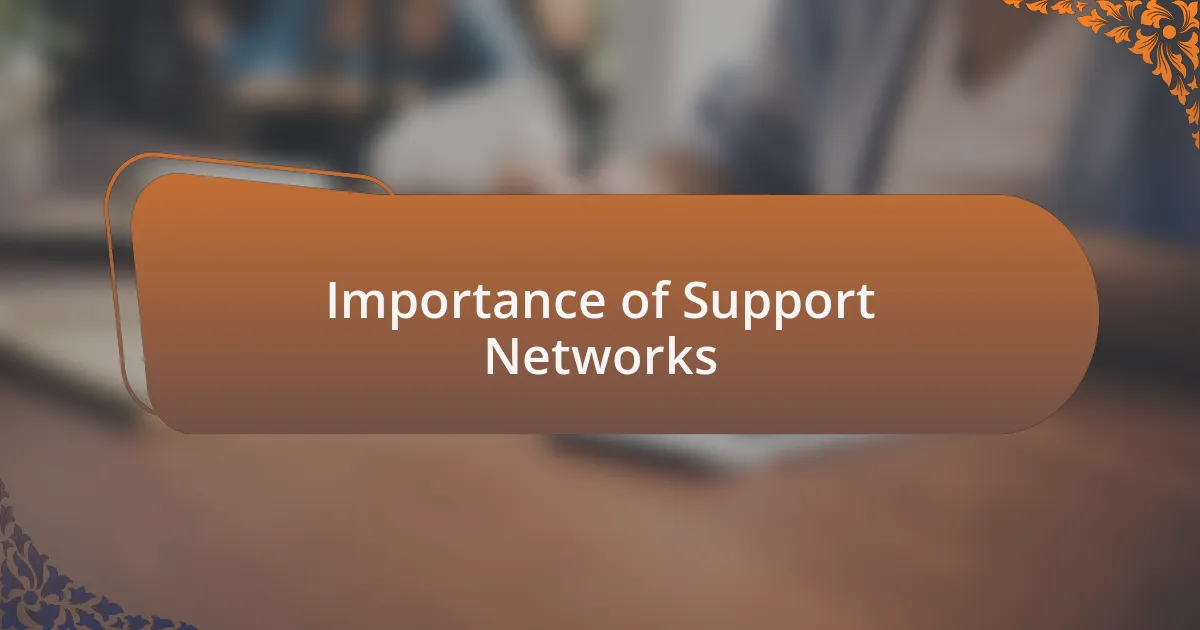
Importance of Support Networks
Building a support network is crucial for individuals facing the challenges of selective mutism. I recall feeling like a ship lost at sea, battling waves of anxiety without any lifebuoy in sight. Having just one person who understood my struggles could have made all the difference—someone to reassure me that I wasn’t alone in this fight.
Support networks can provide not only emotional reflection but also practical strategies for navigating everyday situations. I remember my friend who would gently prompt me during group outings, giving me the nudge I needed to share my thoughts. Isn’t it fascinating how a little encouragement from someone who understands can ignite confidence?
Moreover, a strong support system can foster an environment that promotes growth and resilience. I found that sharing my experiences within a trusted group surprisingly lightened my burden. The sense of belonging can transform the daunting challenges of selective mutism into manageable hurdles. What would it have meant for me to know others were walking this same path, ready to lend their strength? Quite simply, it’s empowering.
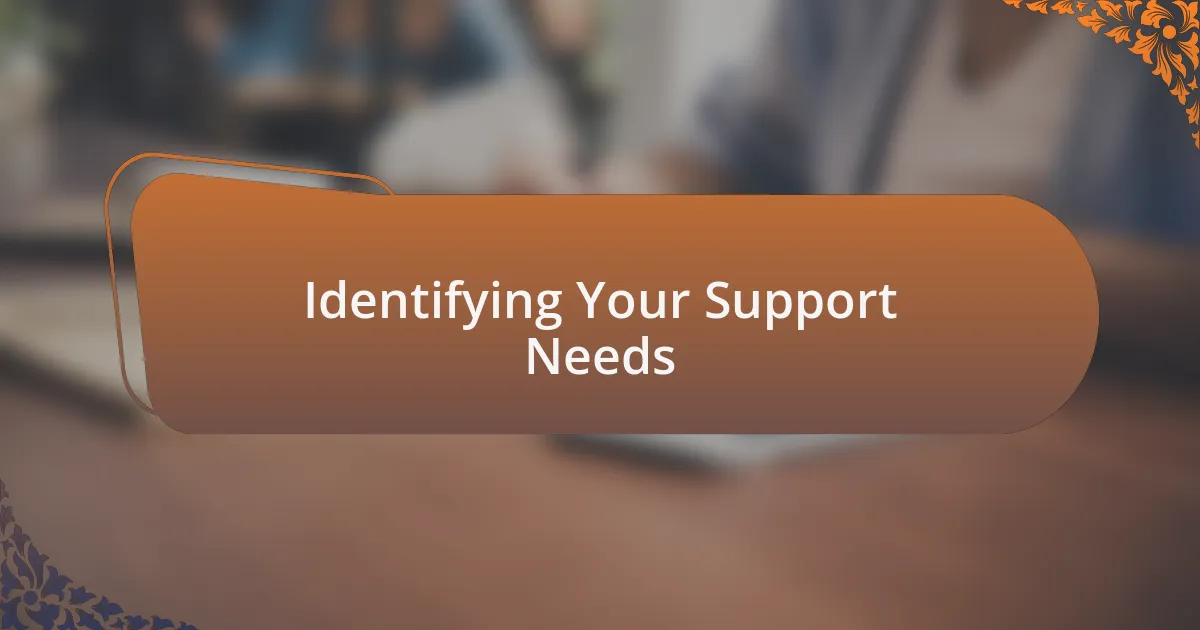
Identifying Your Support Needs
When I first started to think about my support needs, it felt overwhelming. I sat down and made a list—not just of the people in my life, but what I truly needed from them. Did I want someone to listen or someone who could help me practice speaking in social settings? Understanding this distinction allowed me to pinpoint who in my circle could genuinely offer the right kind of support.
I remember a moment when I reached out to a family member who had struggled with anxiety. I shared my needs openly, and her response was incredibly validating. She understood what it meant to have a voice that felt trapped. This conversation not only strengthened our relationship but also helped me clarify my need for empathetic listeners over casual acquaintances. Have you ever had a conversation that unexpectedly illuminated your feelings?
Reflecting on my journey, I learned that identifying support needs is an evolving process. Sometimes, we don’t realize what we require until a situation arises. For instance, there were times when I craved practical strategies rather than just emotional support. Having friends who were not only understanding but also willing to share coping mechanisms became vital. It highlighted how essential it is to communicate what you need clearly—after all, how can we expect others to help if we keep our struggles to ourselves?
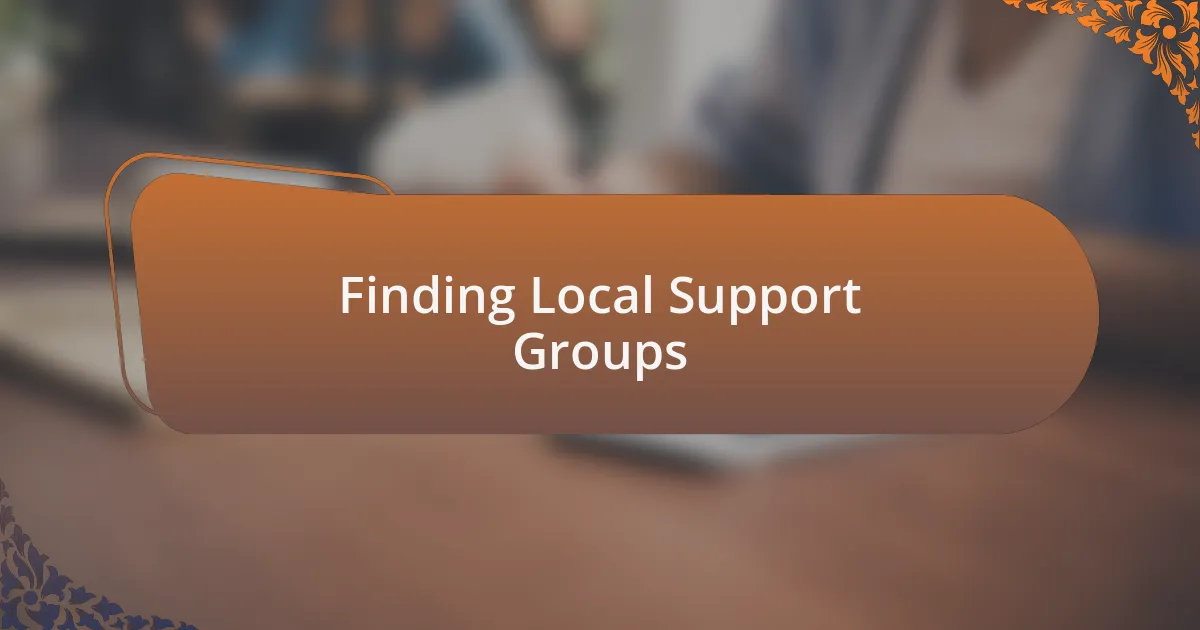
Finding Local Support Groups
Finding local support groups can sometimes feel like searching for a needle in a haystack, but it’s truly worth the effort. I remember my own experience browsing community bulletin boards and local websites, hoping to find a group that resonated with me. When I finally stumbled upon a meeting held at a nearby library, it felt like a small victory. Have you ever felt that spark of hope when faced with daunting challenges?
Engaging with local support groups gave me an incredible sense of belonging. The first time I attended a meeting, I was struck by the openness in the room. Each person shared their unique journey with selective mutism, and I found comfort in their stories. I realized that I wasn’t alone in my struggles; together, we created a supportive atmosphere where we could learn and grow. Isn’t it remarkable how sharing experiences can help us feel connected in our loneliness?
Using social media can also be a game-changer in finding these groups. I recall joining a Facebook group dedicated to selective mutism support, where members frequently posted about local meetups. It made reaching out feel less intimidating. By tapping into online resources, I was able to connect with others who shared my journey, which ultimately led me to more local gatherings. Have you explored the online communities available to you? They might just lead you to the support you’ve been searching for.
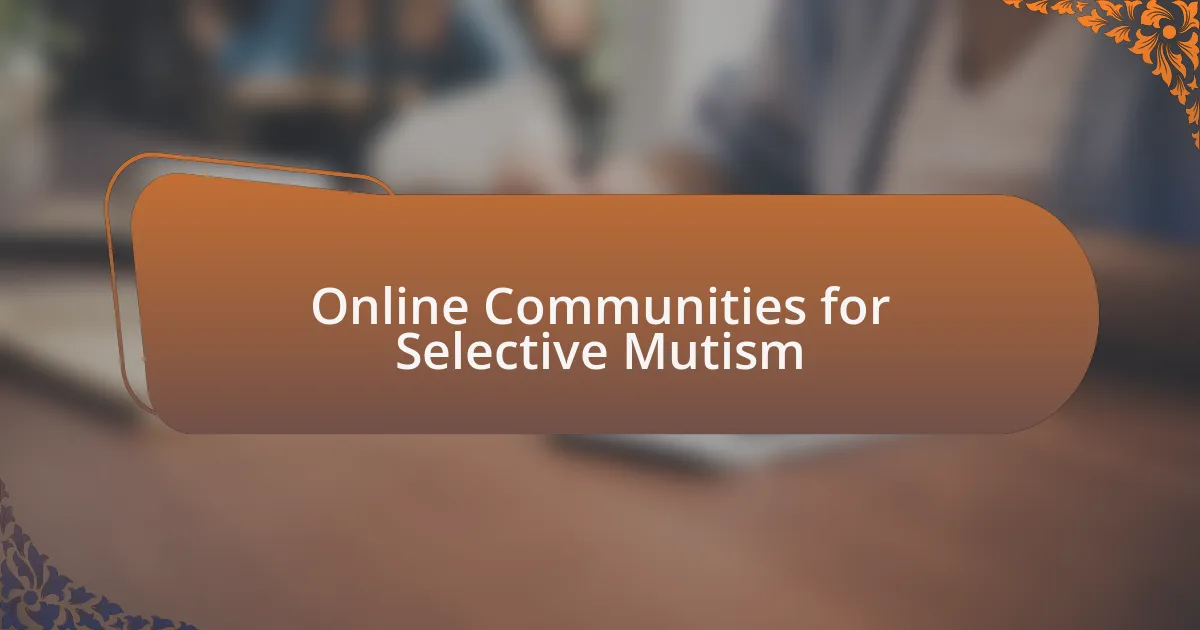
Online Communities for Selective Mutism
Finding online communities for selective mutism has been a lifeline for many, including myself. When I first discovered a dedicated forum, I felt an overwhelming sense of relief. I vividly remember reading through the posts, feeling those familiar emotions echoed back to me by others. Have you ever experienced that moment when someone captures exactly what you are feeling? It’s incredibly comforting.
One of my favorite aspects of these online spaces is the diverse mix of experiences shared by people from all over the globe. In one discussion, members exchanged tips on coping strategies that had worked for their children, creating a treasure trove of insights. I found it fascinating how different cultures approach selective mutism, yet the core feelings of isolation and hope unite us all. Isn’t it amazing how technology can bridge distances and foster connections?
Participating in these communities is simple and can be done at your own pace. I remember joining a live chat session late one night, skeptically wondering if it would be worth my time. I ended up sharing my own story and received feedback that lifted my spirits tremendously. The kind words from strangers who truly understood my journey made me think: How many others are out there, waiting for that validation? Online communities not only provide support but also empower us to find our voices together.
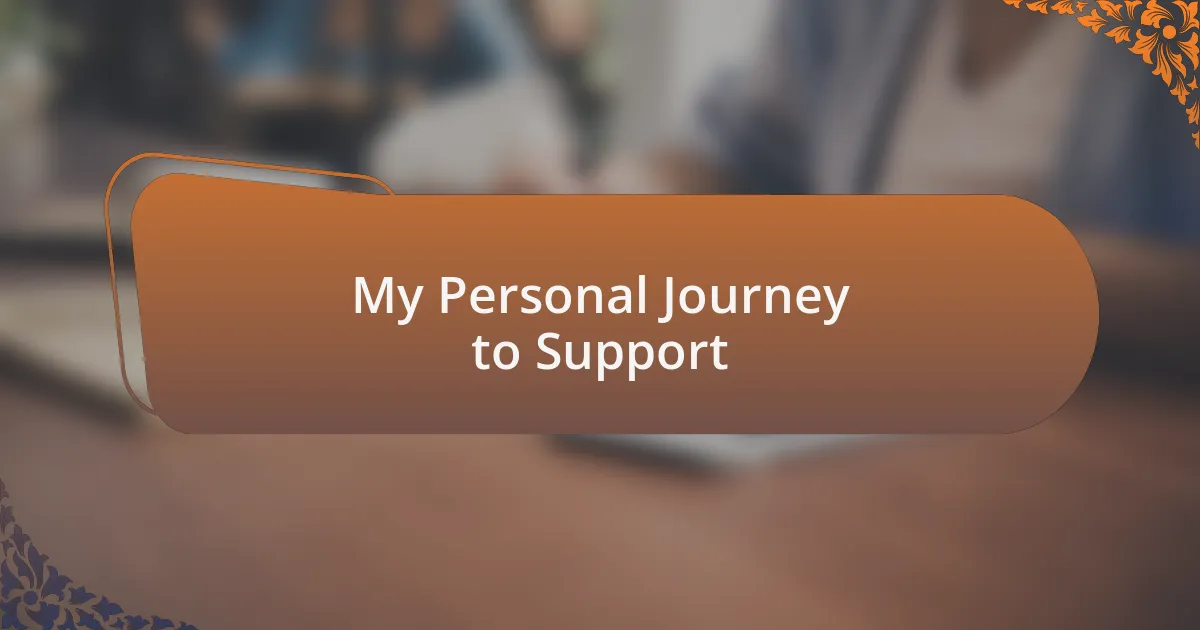
My Personal Journey to Support
I remember the first time I reached out for support beyond online forums. It was at a local workshop for parents of children with selective mutism. Walking in, I was anxious, but the moment I heard someone share their story, it felt like a dam of emotions had broken. Have you ever felt that rush of relief when you know you’re not alone? That connection, forged through shared experiences, turned strangers into allies in my journey.
Over time, I began forming deeper relationships with some of the participants. We organized regular meet-ups, and I found myself sharing not just challenges but also small victories, like my child saying a word in a new setting. These gatherings became more than just support sessions; they evolved into a safe haven where laughter and tears intertwined. It was heartening to see how others understood the nuances of living with selective mutism, as they echoed my concerns and celebrated milestones with genuine enthusiasm.
In retrospect, I realize that seeking support was one of the best decisions I made. I often reflect on how vital these connections are to my wellbeing. Have you considered how your own support network can change your perspective? For me, it transformed my sense of isolation into a vibrant tapestry of shared journeys, reminding me that together, we are stronger.